|
Books Should Be Free Loyal Books Free Public Domain Audiobooks & eBook Downloads |
|
|
Books Should Be Free Loyal Books Free Public Domain Audiobooks & eBook Downloads |
|
Literature |
|---|
|
Book type:
Sort by:
View by:
|
By: Irvin S. Cobb (1876-1944) | |
|---|---|
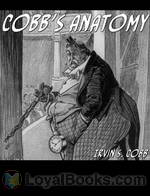 Cobb's Anatomy
Cobb's Anatomy
Irvin Shrewsbury Cobb was born on June 23, 1876. At seventeen years of age, he began writing for the Paducah Daily News, his hometown paper. At nineteen he became the managing editor; up to that point, our nation’s youngest. He worked as a columnist, a humorist and an author. But ‘horror,’ and ’short stories,’ are not why he is remembered. He is remembered because he was, and still is, funny. And although he is now dead–he died March 11, 1944–this work “Cobb’s Anatomy,” among others, has left an indelible mark upon mankind: a smile. | |
 One Third Off
One Third Off
Irvin Shrewsbury Cobb (June 23, 1876–March 11, 1944) was an American author, humorist, and columnist who lived in New York and wrote over 60 books and 300 short stories. Cobb has been described as “having a round shape, bushy eyebrows, full lips, and a triple chin. He always had a cigar in his mouth.” This book is a hilarious account of Cobb’s attempts at weight-loss. | |
By: Irving Bacheller (1859-1950) | |
|---|---|
 Eben Holden - A Tale of the North Country
Eben Holden - A Tale of the North Country
Eben Holden - A Tale of the North Country. Having lost both parents and his home in northern Vermont, orphan Willie Brower is taken in by Eben Holden, "Uncle Eb" who transports him westward to save him from being sent to an orphanage. Through the Adirondacks and into the St. Lawrence valley they travel. Eben is kind, happy, and loves to tell stories to the youngster, many of which were to shape the life and ideals of Willie during his life.This story follows Willie as a young orphan, later as a journalist, and finally as a soldier who enlists in the army at the outset of the American Civil War... | |
By: Isabella Alden (1841-1930) | |
|---|---|
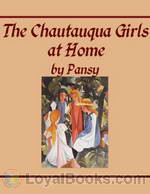 The Chautauqua Girls at Home
The Chautauqua Girls at Home
Sequel to Four Girls at Chautauqua. Ruth, Flossy, Eurie, and Ruth return home as new Christians, eager to begin working. Their new faith clashes with their old lives, which they must overcome, as well as the prejudices of friends and acquaintances. | |
By: Isabella Lilias Trotter (1853-1928) | |
|---|---|
 Parables of the Cross
Parables of the Cross
Death is the Gate of Life. There was deep insight in those old words. For man's natural thought of death is that of a dreary ending in decay and dissolution. And from his standpoint he is right: death as the punishment of sin is an ending.But far other is God's thought in the redemption of the world. He takes the very thing that came in with the curse, and makes it the path of glory. Death becomes a beginning instead of an ending, for it becomes the means of liberating a fresh life.And so the hope that lies in these parable lessons of death and life is meant for those only who are turning to Him for redemption... | |
By: Isabella Matilda Davis Brittingham (1852-1924) | |
|---|---|
 The Revelation of Baha-ullah in a Sequence of Four Lessons
The Revelation of Baha-ullah in a Sequence of Four Lessons
Isabella Matilda Davis Brittingham was a significant early American Bahá’í and was posthumously designated by Shoghi Effendi as one of the 19 Disciples of ‘Abdu’l-Bahá and Heralds of the Covenant. She was born in 1852, the daughter of Benjamin Davis, who was a grandson of John Morton, a signer of the Declaration of Independence. Her sister-in-law heard about the Bahá’í Faith in 1897 and in 1898 Isabella herself became a part of the nascent American Bahá’í community. In September 1901, Isabella went on pilgrimage to the Holy Land, where she met ‘Abdu’l-Bahá, the leader of the Bahá’í Faith and son of the Founder, Bahá’u'lláh... | |
By: Israel Zangwill (1864-1926) | |
|---|---|
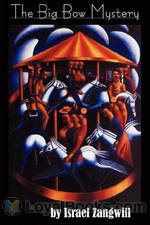 The Big Bow Mystery
The Big Bow Mystery
Regarded as the first full-length locked room mystery, the novel focuses on a murder that has occurred inside a locked room, with no clear indication as to the weapon used, the perpetrator of the horrendous crime, or a possible escape route. Needless to say, The Big Bow Mystery has all the elements necessary to engage its audience and encourage them to look between the lines in an attempt to unravel the complex murder. Set in Bow, east London, the novel opens when Mrs. Drabdump, a widow who rents out rooms, panics when one of her lodgers does not respond to her fervent attempts to wake him... | |
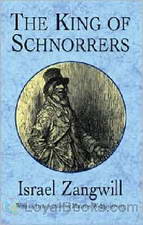 The King of Schnorrers
The King of Schnorrers
Manasseh da Costa is a schnorrer (beggar) who lives on the charitable contributions of the Jews of late 18th-century London. But Manasseh is far from being a humble panhandler for, as every schnorrer knows, supporting the poor is a commandment from God (a mitzvah) not just a favour. And as the descendant of Portuguese Jews who had lived in England for many generations, Manasseh is the social superior of those newly arrived from Eastern Europe (called ‘Tedesco’), even his wealthy patron Joseph Grobstock... | |
By: Ivan Goncharov (1812-1891) | |
|---|---|
 Common Story
Common Story
Alexander Fedoritch Adouev is the naïve, pampered son of Anna Pavlovna, a provincial landowner. He decides to go off to Saint Petersburg, not only to make his mark upon society but also to fulfill his two rosy romantic dreams of becoming a great writer and finding a great love. He is taken under the reluctant wing of his uncle, Piotr Ivanitch Adouev, a pragmatic, hard-headed businessman who scorns everything romantic and tries to cure Alexander Fedoritch of his sentimental, youthful illusions. The... | |
By: Ivan S. Turgenev (1818–1883) | |
|---|---|
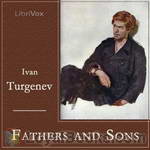 Fathers and Sons
Fathers and Sons
The fathers and children of the novel refers to the growing divide between the two generations of Russians, and the character Yevgeny Bazarov has been referred to as the “first Bolshevik”, for his nihilism and rejection of the old order. Turgenev wrote Fathers and Sons as a response to the growing cultural schism that he saw between liberals of the 1830s/1840s and the growing nihilist movement. Both the nihilists (the “sons”) and the 1830s liberals sought Western-based social change in Russia... | |
By: J. M. Barrie (1860-1937) | |
|---|---|
 Peter Pan
Peter Pan
His name has become a metaphor for one who will never grow old. Peter Pan by JM Barrie is the story of a boy who remains a boy while the world around him changes. Sir James Mathew Barrie was a Scottish playwright and novelist whose works were received with great critical and commercial success in the late nineteenth and early twentieth century. He discovered the main inspiration for his creative genius in his friendship (and later guardianship) with the children of Arthur and Sylvia Llewellyn-Davies... | |
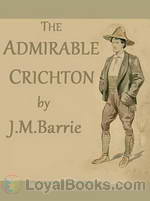 The Admirable Crichton
The Admirable Crichton
From the author of Peter Pan:Lord Loam, a British peer, considers class divisions to be artificial. He promotes his views during tea-parties where servants mingle with his aristocratic guests, to the embarrassment of all. Crichton, his butler, particularly disapproves of this.Loam, his family, a maid, and Crichton are shipwrecked on a deserted tropical island. The resourceful Crichton is the only one of the party with any practical knowledge. Eventually, social roles are reversed, and Crichton becomes the governor. | |
 Peter and Wendy
Peter and Wendy
Peter and Wendy tells the classic story of Peter Pan, a mischievous little boy who can fly, and his adventures on the island of Neverland with Wendy and her brothers, the fairy Tinker Bell, the Lost Boys, the Indian princess Tiger Lily, and the pirate Captain Hook. (Introduction modified from Wikipedia) | |
 Little White Bird
Little White Bird
"A children's book, sharp social commentary and sad psychological thriller about a man's search for a sense of belonging. All in one amazing and lyrical collection. This is the first book in which Peter Pan starts to appear. His adventure in Kensington Gardens are first narrated here. Other than that, it offers a magical portrait of contemporary London, and a realistic tale of a family to which every one of us could have belonged." | |
 Dear Brutus
Dear Brutus
At a house in the country 8 guests are invited to enter a magical wood to see what might have happened had they made a different choice in life. Even though they are warned away from the wood, they take a chance and enter. The title comes from Shakespeare: "The fault lies in our selves, dear Brutus, not in our stars...," and summarizes the theme of this play: given a second chance, will people still make the same mistakes? | |
By: J. Thorne Smith, Jr. (1892-1934) | |
|---|---|
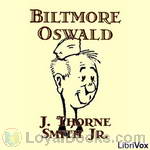 Biltmore Oswald
Biltmore Oswald
The hilarious diary of a young man's recruitment into, and service in a navy, which, though well equipped and disciplined, remains woefully ill prepared for his arrival and dubious contribution. (Introduction by Nigel Boydell) | |
By: Jack London (1876-1916) | |
|---|---|
 The Sea Wolf
The Sea Wolf
A maritime classic acclaimed for its exciting adventure, The Sea Wolf offers a thrilling tale of life at sea, while exploring the many difficulties that may erupt on board a ship captained by a brutally hedonistic and controlling individual. Additionally, the psychological adventure novel covers several themes including mutiny, existentialism, individualism, brutality, and the intrinsic will to survive. The novel sets into motion when its protagonist, the soft and cultivated scholar Humphrey van Weyden, is witness to a precarious collision between his ferry and another ship... | |
 The Faith of Men
The Faith of Men
A collection of short stories by author Jack London | |
 John Barleycorn or Alcoholic Memoirs
John Barleycorn or Alcoholic Memoirs
Jack London died at the age of forty. In this autobiographical work, London describes his life as seen through the eyes of John Barleycorn (alcohol). There is much controversy about the cause of his death just as there is about alcoholism and addiction. London’s brutally frank and honest analysis of his own struggles and bouts with alcohol was way before its time and more modern theories of addiction. With remarkable candor and insight, London describes the demons and gods he encountered through both friend and enemy, John Barleycorn. | |
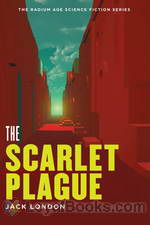 The Scarlet Plague
The Scarlet Plague
Known mainly for his tales of adventure, this work of science fiction by Jack London is set in a post-apocalyptic future. It’s 2072, sixty years after the scarlet plague has depopulated the planet. James Howard Smith is one of the few survivors of the pre-plague era left alive in the San Francisco area, and as he realizes his time grows short, he tries to impart the value of knowledge and wisdom to his grandsons. Through his narrative, we learn how the plague spread throughout the world and of the struggles of the handful of survivors it left in its wake. The Scarlet Plague was originally published in London Magazine in 1912. | |
 The Iron Heel
The Iron Heel
A dystopian novel about the terrible oppressions of an American oligarchy at the beginning of the Twentieth Century, and the struggles of a socialist revolutionary movement. (Introduction by Matt Soar) | |
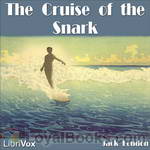 The Cruise of the Snark
The Cruise of the Snark
The Cruise of the Snark (1913) is a memoir of Jack and Charmian London’s 1907-1909 voyage across the Pacific. His descriptions of “surf-riding”, which he dubbed a “royal sport”, helped introduce it to and popularize it with the mainland. London writes: Through the white crest of a breaker suddenly appears a dark figure, erect, a man-fish or a sea-god, on the very forward face of the crest where the top falls over and down, driving in toward shore, buried to his loins in smoking spray, caught up by the sea and flung landward, bodily, a quarter of a mile... | |
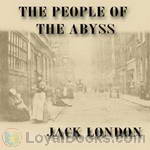 The People of the Abyss
The People of the Abyss
Jack London lived for a time within the grim and grimy world of the East End of London, where half a million people scraped together hardly enough on which to survive. Even if they were able to work, they were paid only enough to allow them a pitiful existence. He grew to know and empathise with these forgotten (or ignored) people as he spoke with them and tasted the workhouse, life on the streets, … and the food, which was cheap, barely nutritious, and foul.He writes about his experiences in... | |
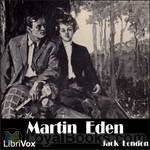 Martin Eden
Martin Eden
Martin Eden (1909) is a novel by American author Jack London, about a struggling young writer. It was first serialized in the Pacific Monthly magazine from September 1908 to September 1909, and subsequently published in book form by The Macmillan Company in September 1909.This book is a favorite among writers, who relate to Martin Eden's speculation that when he mailed off a manuscript, 'there was no human editor at the other end, but a mere cunning arrangement of cogs that changed the manuscript from one envelope to another and stuck on the stamps,' returning it automatically with a rejection slip... | |
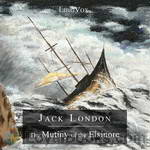 The Mutiny of the Elsinore
The Mutiny of the Elsinore
This is the story of a voyage of a sailing ship from Baltimore to Seattle, east-to-west around Cape Horn in the winter. It is set in 1913 and the glory days of “wooden ships and iron men” are long over. The Elsinore is a four-masted iron sailing vessel carrying a cargo of 5000 tons of coal. She has a “bughouse” crew of misfits and incompetents. This book was published in 1915 and some actions of some of the characters seem odd to us today. There is romance, but it is strangely platonic. Two important characters disappear with no real explanation... | |
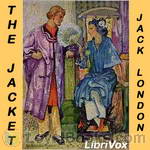 The Jacket (or Star Rover)
The Jacket (or Star Rover)
This book by Jack London was published under the name of "The Jacket" in the UK and "The Star Rover" in the US. A framing story is told in the first person by Darrell Standing, a university professor serving life imprisonment in San Quentin State Prison for murder. Prison officials try to break his spirit by means of a torture device called "the jacket," a canvas jacket which can be tightly laced so as to compress the whole body, inducing angina. Standing discovers how to withstand the torture by entering a kind of trance state, in which he walks among the stars and experiences portions of past lives... | |
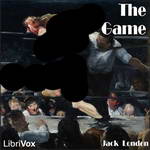 The Game
The Game
Jack London wrote at least four stories about boxing; A Piece of Steak (1909), The Mexican (1911), The Abysmal Brute (1911), and The Game (1905). The Game is told, in part, from the point of view of a woman, the fiancée of one of the competitors. This is to be his last fight and they are to be married on the morrow. Against her better judgment, she agrees to watch the bout. (Introduction by Tom Crawford) | |
 Valley of the Moon
Valley of the Moon
The novel Valley of the Moon is a story of a working-class couple, Billy and Saxon Roberts, struggling laborers in Oakland at the Turn-of-the-Century, who left the city life behind and searched Central and Northern California for a suitable farmland to own. The book is notable for the scenes in which the proletarian hero enjoys fellowship with the artists' colony in Carmel, and he settles in the Valley of the Moon. | |
 Burning Daylight
Burning Daylight
Burning Daylight, Jack London's fictional novel published in 1910, was one of the best selling books of that year and it was his best selling book in his lifetime. The novel takes place in the Yukon Territory in 1893. The main character, nicknamed Burning Daylight was the most successful entrepreneur of the Alaskan Gold Rush. The story of the main character was partially based upon the life of Oakland entrepreneur "Borax" Smith. (Wikipedia) | |
 Before Adam
Before Adam
"Before Adam is a mixture of sound science and sci-fi speculation. It is based around Darwin's theory of evolution and the idea of racial memory. The main character lives in the current world but has dreams and nightmares that he relives the pre-stone age life of one of his proto-human ancestors. Those who are scientifically inclined may enjoy this novel more than fans of "standard" science fiction such as Edgar Rice Burroughs. | |
 When God Laughs, and Other Stories
When God Laughs, and Other Stories
This collection of Jack London's short stories touches on a variety of topics, from his love of boxing, to relationships between criminals, to the trials of life and travel on many frontiers, to an allegory about a king who desired a nose. London is considered a master of the short story, a form much more to his liking and personality than his novels. He was active and quick of mind and the short story suited him well. | |
 Stories of Ships and the Sea
Stories of Ships and the Sea
5 Exciting short stories by one of Americas best story tellers | |